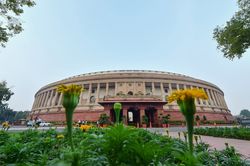Parliamentarians are known for unleashing oral barrages during debates, with the presiding officer having to repeatedly ask them to conclude. But the CPI’s Rajya Sabha MP Binoy Viswam got into trouble with his party for using the word oral. Viswam thought he was taunting the government when he asked for an oral amendment during the discussion on the controversial agriculture marketing reforms. But, CPI general secretary D. Raja was not amused; perhaps more so when Viswam stated he would vote with the BJP members if Agriculture Minister Narendra Singh Tomar could give an assurance that the minimum support price scheme will be protected. While opposition parties were accusing the government of a conspiracy to dismantle the half century old price protection given to farmers, Viswam’s rhetorical flourish gave the contrary signal.
Even though Raja frowned, Viswam should be thrilled to get the credit for introducing the phrase “oral amendment” to the parliamentary lexicon. He had baffled experts hurriedly searching the Constitution and the Rules of Procedure to check whether a minister could amend a law by mouth. They came up with a unanimous no. Even the president or prime minister cannot alter the words of a written law. The Supreme Court can interpret it in new ways. If, during the debate, the government accepts the suggestions or demands of a member, then the concerned minister has to introduce a written amendment. The process of consideration before passing a law is called reading, where every word mentioned in the draft is considered and approved clause by clause.
In one way, Viswam was not wrong. Two oral assurances made to Parliament and to state governments have been controversial. Both, interestingly, involve former finance minister Arun Jaitley. One is the Centre refusing to pay the shortfall in GST this year; Finance Minister Nirmala Sitharaman has told all states to borrow the shortfall from the Reserve Bank of India. Though BJP- and NDA-run governments have agreed, while murmuring about the interest burdens, finance ministers of opposition-ruled states such as Punjab, Kerala, West Bengal and Maharashtra are crying foul. They quote a promise by Jaitley in 2016. Jaitley had insisted in both the finance ministers’ conference and in Parliament that any shortfall would be paid out of the GST compensation fund.
While Jaitley had declared “We will compensate...”, his successor, Sitharaman, and Attorney General K.K. Venugopal are convinced that “We” meant the GST Council, of which the Centre and the states are members. The finance ministry insists that it was not a grand “We” meaning the Central government, but a collective “We” referring to the Union and state governments.
The other instance of an oral assurance not being followed through was when Jaitley wriggled out of a verbal commitment made to Parliament by former prime minister Manmohan Singh. While intervening in an acrimonious debate on the bill to divide Andhra Pradesh in 2014, Singh told the agitated members from what would be the residual state of Andhra Pradesh, without the cash cow of Hyderabad, that the Centre would give special status to the state for a decade. But, the elections saw the rout of the Congress and the emergence of Telugu Desam Party-BJP combine in Andhra. Chief minister N. Chandrababu Naidu, put pressure, first friendly, then annoyedly, on the Central government, run by his regional ally, to make good on the promise by Singh. It would have meant more Central funds and support for mega projects.
But, Jaitley turned the tables. He asked Naidu why the oral agreement was not incorporated into the bill by the Congress. He added that the 14th Finance Commission’s recommendation of higher revenue share to states from Central taxes had abolished the special status scheme, and that Parliament had accepted it.
Naidu could not get it for five years and now his successor Jagan Mohan Reddy has also not got it. Given the pressures on the economy, that is another pie in the sky.
sachi@theweek.in


